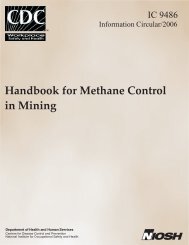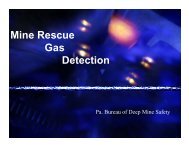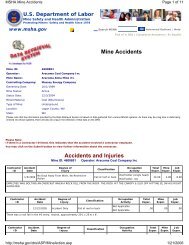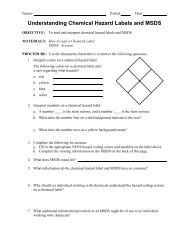American Coal Concert Series Launched - Coal News
American Coal Concert Series Launched - Coal News
American Coal Concert Series Launched - Coal News
Create successful ePaper yourself
Turn your PDF publications into a flip-book with our unique Google optimized e-Paper software.
2<br />
June 2010<br />
<strong>Coal</strong> <strong>News</strong><br />
Sen. Rockefeller<br />
Outlines Safety<br />
Legislation<br />
Sen. J. Rockefeller (D-WVa)<br />
has announced his broad outlines<br />
for mine safety improvements<br />
and has described his<br />
“new legislative approaches”<br />
including adding workplace safety<br />
enforcement and accountability<br />
standards through MSHA and<br />
OSHA. His approach also<br />
includes: streamlining the<br />
Pattern of Violation rules and<br />
regulations so that repeat<br />
offenders are subject to additional<br />
oversight and enforcement;<br />
reducing the appeals<br />
backlog at the Federal Mine<br />
Safety and Health Review<br />
Commission; improving whistleblower<br />
protections; and increasing<br />
fines and penalties for companies<br />
that “routinely violate<br />
safety laws and regulations.”<br />
Rockefeller has also introduced<br />
an amendment to the<br />
financial reform legislation now<br />
on the Senate floor that would<br />
require publicly traded mining<br />
companies to include “critical<br />
mine safety information” in their<br />
annual and quarterly filings with<br />
the Securities and Exchange<br />
Commission (SEC). The Senate<br />
Appropriations Committee has<br />
conducted a hearing to review<br />
current safety resources of federal<br />
agencies including MSHA and<br />
the Senate Committee on Health<br />
Education Labor and Pensions<br />
has held hearings on the safety<br />
enforcement authority at MSHA<br />
and OSHA.<br />
Funds Approved<br />
for FMSHRC<br />
The Senate Appropriations<br />
Committee has approved $22<br />
million in additional funding to<br />
reduce the backlog in the number<br />
of mine safety citation appeals<br />
pending before the Federal Mine<br />
Safety and Health Revision<br />
Commission (FMSHRC). Of the<br />
funding, $18.2 million is for the<br />
Solicitor of Labor and MSHA, and<br />
$3.8 million is for the FMSHRC.<br />
The new funding will be available<br />
for twelve months as part of the<br />
FY 2010 Supplemental<br />
Appropriations bill. House staff<br />
are reporting that members<br />
believe the Senate funding is too<br />
low and will include more dollars<br />
in their version.<br />
House Members<br />
Condemn EPA’s<br />
Actions on <strong>Coal</strong><br />
Rep. Hal Rogers (R-KY) joined<br />
by twenty-two other members of<br />
the House of Representatives,<br />
both Republicans and Democrats<br />
representing districts in fourteen<br />
states throughout the U.S., is<br />
condemning the EPA for delays in<br />
coal mine permitting and for<br />
guidance on CWA permits in<br />
Appalachian mines that relies on<br />
conductivity as a sole measure of<br />
stream impairment. The group<br />
called upon EPA Administrator<br />
Lisa Jackson to withdraw recently<br />
implemented rules that have<br />
“caused significant barriers and<br />
delays in issuing job creating<br />
coal mining permits throughout<br />
the region.”<br />
The group, from both parties,<br />
characterized EPA’s new rules on<br />
surface mining as the<br />
Administration’s “latest tactic in<br />
its war against Appalachian<br />
<strong>Coal</strong>” and pointedly said EPA has<br />
“crossed the line” and is putting<br />
80,000 jobs in jeopardy. The letter<br />
asks EPA to “immediately<br />
withdraw policies that jeopardize<br />
mining and mining families<br />
throughout Appalachia” and<br />
points to EPA’s preemption of<br />
federally approved state water<br />
quality programs.<br />
Analysis Finds<br />
Fault with Study<br />
of Appalachian<br />
<strong>Coal</strong> Community<br />
Health<br />
An analysis commissioned by<br />
NMA has found factual discrepancies<br />
and methodical flaws in<br />
studies published by Dr. Michael<br />
Hendryx and others, contending<br />
that increased mortality in<br />
Appalachian communities was<br />
due to high rates of coal production<br />
in the area. The analysis was<br />
completed by Jonathan Borak,<br />
MD, Clinical Professor,<br />
Epidemiology and Medicine at<br />
Yale University; and Kathryn<br />
Salipante Zaidel, MEM.<br />
In their review of eight peerreviewed<br />
journal articles<br />
authored by Dr. Hendryx, they<br />
noted the complete omission of<br />
obesity, diabetes, and alcohol<br />
consumption from the Hendryx<br />
analyses as important factors<br />
that could influence health and<br />
mortality rates in Appalachia.<br />
Borak also pointed to Hendryx’s<br />
finding of high mortality rates in<br />
Appalachian counties with high<br />
levels of coal mining, but not<br />
among coal miners and not in<br />
other coal mining areas. All the<br />
observation led Hendryx to propose<br />
that his findings of excess<br />
death might be related to the<br />
unique “topography and population<br />
centers characteristic of<br />
Appalachia,” Borak and Zaidel<br />
concluded. “These results also<br />
suggest that coal mining is not<br />
the reason for excess deaths.”<br />
Hendryx has been a popular<br />
witness before state and federal<br />
legislative and regulatory bodies,<br />
including congressional hearings,<br />
and his studies have also<br />
received widespread attention in<br />
West Virginia media. NMA Senior<br />
VP for Regulatory Affairs, Bruce<br />
Watzman, said, “Dr. Borak’s findings<br />
are important to the entire<br />
mining community. They raise<br />
fundamental questions about the<br />
conclusions reached by Dr.<br />
Hendryx and their relevance to<br />
any assessment of the overall<br />
contributions of mining in<br />
Appalachia.”<br />
NMA <strong>Coal</strong><br />
Forecast<br />
Updated<br />
NMA’s Economics <strong>Coal</strong><br />
Subcommittee is forecasting that<br />
domestic coal consumption will<br />
rebound from 2009 levels,<br />
increasing 5.5% in 2010, based<br />
on the Subcommittee’s update of<br />
the 2010 forecast. Due to reduction<br />
of high coal stockpiles by<br />
utilities, total demand for mined<br />
coal is expected to increase by<br />
only 0.9%, as total U.S. production<br />
is expected to be down 0.7%<br />
from 2009 with production from<br />
Eastern coalfields down 2.9%.<br />
The forecast indicates that<br />
total domestic coal consumption<br />
will be 1.008 billion tons for<br />
electricity, including electric<br />
power, commercial, and industrial<br />
sectors. Domestic coking coal<br />
consumption is expected to be<br />
up 24.2% to 27 million tons, and<br />
total exports will be up 26.9% to<br />
75 million tons in 2010, with<br />
exports of met coal to Canada<br />
and overseas making up the<br />
lion’s share of exports at 57 million<br />
tons. The NMA<br />
Subcommittee expects the economy<br />
to grow at about 3% in 2010.<br />
Top Challenges<br />
Ranked by<br />
Mining<br />
Executives<br />
As surveyed, mining executives<br />
from 113 North <strong>American</strong> metals<br />
and minerals companies and<br />
ranked their top five challenges.<br />
“Ensuring workplace safety” was<br />
listed by 71% of the respondents<br />
as their top challenge. This was<br />
followed by “improving performance<br />
and operational effectiveness”<br />
which 67% identified as a<br />
top challenge. Other items on the<br />
list were “managing capital projects”<br />
which was ranked by 46%,<br />
“recruiting and retaining a<br />
skilled workforce” ranked by<br />
38%, and “addressing environmental<br />
concerns” ranked as a<br />
top challenge by 37%.<br />
The coal companies in the<br />
group ranked their number one<br />
obstacle to organic growth as<br />
“decline in market demand” plus<br />
all companies surveyed said the<br />
number one obstacle to organic<br />
growth is “complying with government<br />
regulations” which was<br />
identified by 42% of the respondents.<br />
Some 87% of respondents<br />
said they were pursuing an<br />
aggressive cost control strategy<br />
as their top way to maintain profitability<br />
in the current economy.<br />
Senate Climate<br />
Proposal<br />
Unveiled<br />
Sens. John Kerry (D-Mass) and<br />
Joe Lieberman (I-Conn) have<br />
unveiled their version of climate<br />
legislation, the “<strong>American</strong> Power<br />
Act”. According to a summary of<br />
the proposal, the bill will call for<br />
a 17% cut in emissions of greenhouse<br />
gases (GHGs) below the<br />
2005 level by 2020 and an 80%<br />
reduction by 2050. Emissions<br />
limits would apply differently<br />
and, according to various timetables<br />
for various industry sectors,<br />
begin with powerplants in 2013.<br />
The measure directs much of the<br />
revenue generated to rebates<br />
and other assistance for consumers<br />
and businesses impacted<br />
by higher electricity costs, to<br />
fund various programs that would<br />
be mandated by the proposal,<br />
and for debt reduction.<br />
Two billion dollars in annual<br />
funding for research and development<br />
of carbon capture and<br />
storage technologies would be<br />
funded by a special assessment<br />
on electric utilities for all fossil<br />
fuel-based electricity sold to customers.<br />
In addition to falling<br />
under the cap-and-trade provisions<br />
for utilities, coal-based<br />
power plants permitted in 2009,<br />
or thereafter, would be subject to<br />
a performance standard. That<br />
provision also outlines a process<br />
for accelerating retirements of<br />
coal-based plants to accelerate<br />
reductions in GHGs and other air<br />
pollutants.<br />
NMA has expressed its concern<br />
that the legislation will have a<br />
devastating impact on coal mining<br />
jobs and production over the<br />
next two decades, because the<br />
targets and timetables proposed<br />
for emissions reductions are not<br />
aligned with the expected<br />
deployment of carbon capture<br />
and storage technology. Further,<br />
the legislation will be harmful to<br />
trade exposed energy intensive<br />
industries, such as minerals and<br />
metals mining. If Sens. Kerry and<br />
Lieberman are unable to get sixty<br />
votes for their climate change<br />
bill, the Senate will likely act on a<br />
smaller energy bill instead,<br />
according to Majority Leader<br />
Harry Reid (D-Nev).<br />
Carbon Curbs<br />
Will Devastate<br />
<strong>Coal</strong> Mining<br />
Employment<br />
According to the<br />
Congressional Budget Office<br />
(CBO), after reviewing three economic<br />
impact studies of climate<br />
change policies, controls on carbon<br />
dioxide and other greenhouse<br />
gas emissions will be<br />
especially putative for coal mining<br />
employment. The impact of<br />
these policies on overall employment<br />
over the next few decades<br />
would be modest, but the impact<br />
on coal-based employment<br />
would be substantial, said CBO.<br />
Summarizing studies by<br />
Resources for the Future, Charles<br />
River Associates and the<br />
Brooking’s Institution, CBO projects<br />
coal mining employment will<br />
decline 10-18 percent by 2015<br />
and by more than a third by<br />
2025. Among the fossil fuels targeted<br />
for emissions reduction,”<br />
CBO said. “<strong>Coal</strong> mining would<br />
probably see the largest percentage<br />
decline in employment,”<br />
reflecting coal’s higher greenhouse<br />
gas content and its widespread<br />
use in electricity generation.”<br />
The review found that hard<br />
rock mining would likely suffer<br />
“relatively small” employment<br />
declines over the same period.
















